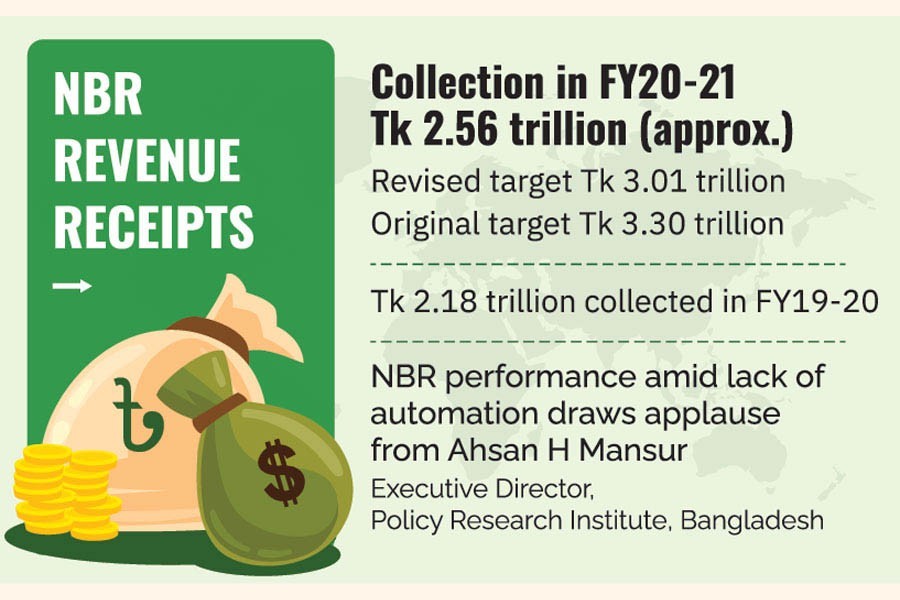Despite economic slowdown due to the Covid-19 pandemic, revenue collection posted a 17 per cent growth in the just-concluded fiscal year (FY) over that of the previous FY thanks to the contribution of the large corporate taxpayers.
The National Board of Revenue (NBR) managed to collect Tk 2.56 trillion in the FY 2020-21 against Tk 2.18 trillion in the previous FY, according to the provisional figures obtained by the FE on Sunday.
The NBR officials expected that the amount would go up further in the final count as the Research and Statistics Wing of the board has started compiling data from the field offices of income tax, customs and VAT.
However, the NBR missed the revised revenue collection target (Tk 3.01 trillion) by Tk 450 billion and the original target (Tk 3.30 trillion) by Tk 740 billion during the last FY.
The income tax wing collected Tk 850 billion, VAT wing Tk 940 billion, and customs wing Tk 770 billion during the period under review.
In FY 21, the VAT collection target was Tk 1.10 trillion, followed by income tax Tk 970 billion and customs duty Tk 940 billion.
Field-level officials said the effort-based collection through monitoring and investigation along with black money whitening opportunities have contributed to the higher revenue growth despite the pandemic.
On average, the NBR achieved 14 per cent growth in revenue collection over the last five years.
Higher operating profits made by banks have helped the large taxpayers' unit (LTU) under the income tax wing surpass the target for the last FY.
Tax collection from the LTU grew by 15.38 per cent in FY 21.
Talking to the FE, a commissioner from a field office said that the opportunity to legalise the undisclosed income made a significant contribution to the revenue collection in the last FY.
A number of potential investors whitened money by enhancing the size of the paid-up capital of different projects without legal complexities, he said.
Some investors from the readymade garment sector, car business, land and other large ventures also whitened their money under the scheme, he added.
Although 20 per cent of the undisclosed money holders are large taxpayers, they contributed 80 per cent of the taxes under the scheme, he said.
The data until June 30 last of the money whitening opportunity is yet to be finalised as some of the field-offices were taking time to compile their data.
Until May 25 last, 10,404 people disclosed their money availing the blanket opportunity offered since July 1, 2020.
The government received taxes worth Tk 14.45 billion against some Tk 144.59 billion whitened under the opportunity.
During the period from 2005-06 to 2019-20, a total of Tk 145.95 billion undisclosed income has been formalised under such opportunities.
The official, however, said the fiscal measures for FY 21 have also contributed to the revenue collection growth that focused more on withholding or at source tax collection.
"Proper collection of source tax also needs strict monitoring by the tax officials," he added.
VAT collection from tobacco, cement, pharmaceuticals and mobile phone companies increased significantly last year.
However, all of the three wings missed their revised target for last FY, but achieved impressive growth over the corresponding period of previous FY.
The tax collection in the month of June witnessed a substantial growth as the officials made all-out efforts to offset the financial crunch of the government amid the Covid-19 pandemic.
In FY 2019-20, the revenue collection had posted a negative growth for the first time since the independence.
However, the government has set the original target of revenue collection for the current FY equivalent to that of the last fiscal for the first time, aiming to give some relief to the taxpayers affected by the pandemic-induced lockdown.
Talking to the FE, Executive Director of the Policy Research Institute (PRI) Dr Ahsan H Mansur appreciated the NBR's performance despite having lack of automation or reform activities.
He said the overall economy is growing moderately and the collection data is on the right track considering the rate of inflation.
The PRI ED said the collection was consistent with the current economic context and reflected the economic recovery from the bottom it reached last year.
However, the new wave of the pandemic may pose another challenge on the future growth in revenue collection unless the vaccination programme works smoothly, he added.
"The last year's collection proves that the NBR can achieve 12 to 14 per cent growth, but the tax-GDP ratio is not increasing accordingly," he added.
To meet the future resource requirement, the government will have to reform the current structure of NBR so that the tax collection doubles to keep it consistent with the GDP growth, he said.


